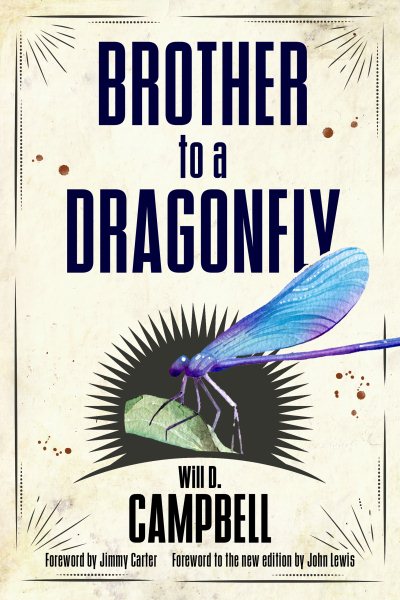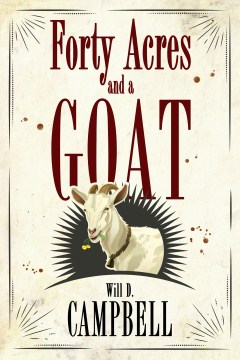By Carter Dalton Lyon. Special to the Clarion-Leger Sunday print edition (May 20)
On this Pentecost Sunday, when believers mark the arrival of the Holy Spirit that empowered the apostles to go forth and proclaim the good news of the Gospel, we would be well served in examining the words of one of God’s more modern-day disciples, Reverend Will D. Campbell. It has been nearly five years since Brother Will’s passing, but his wit and wisdom are as needed now as they have ever been.
Even if you are familiar with Rev. Campbell or one of his seventeen books, I would encourage you to revisit them. Thankfully, the University Press of Mississippi has just published new editions of his two memoirs: Brother to a Dragonfly, which first came out in 1977 and contains new forewords from longtime friends Jimmy Carter and John Lewis, and Forty Acres and a Goat, which was first published in 1986.
The books chronicle Rev. Campbell’s life from his upbringing in Amite County, Mississippi, to his time as a pastor and mentor to civil rights activists, though they are really books about who we are and how we relate to others, whether they are family members, friends, adversaries, or yes, a goat. During an era in which he shaped historical change, he is more interested in explaining how we are shaped by the personal bonds with those around us and how vital it is to seek out those connections.
 Few books could justifiably be called game-changers, but Brother to a Dragonfly was one for me when I first read it in college. It covers his formative years through the height of the civil rights movement as he became, in his words, a self-satisfied white southern liberal. You meet those, like his grandfather, the son of a Confederate soldier, who introduced him to the idea of nonviolence. From the first sentence to the last, you get to know Joe, the titular protagonist who was troubled but was ever the supportive critic, constantly pushing Will to truly evaluate his motives within the movement.
Few books could justifiably be called game-changers, but Brother to a Dragonfly was one for me when I first read it in college. It covers his formative years through the height of the civil rights movement as he became, in his words, a self-satisfied white southern liberal. You meet those, like his grandfather, the son of a Confederate soldier, who introduced him to the idea of nonviolence. From the first sentence to the last, you get to know Joe, the titular protagonist who was troubled but was ever the supportive critic, constantly pushing Will to truly evaluate his motives within the movement.
The murder of a friend, Jonathan Daniels, provided the moment of clarity for Rev. Campbell. He had spent his adult life in a state of self-assured sophistication, but now realized that in seeking racial justice, he had been overlooking the true nature of the tragedy, that poor whites—the murderers of activists like Daniels—were part of the tragedy, too.
 Forty Acres and a Goat is a companion memoir that develops on the lessons from Brother to a Dragonfly and extends them in time as he returned to a rural home, this time to a farm outside of Nashville, Tennessee. We meet Jackson, the goat and gatekeeper to the draft-dodgers and other non-conformists who visited or found refuge in the Campbells’ company.
Forty Acres and a Goat is a companion memoir that develops on the lessons from Brother to a Dragonfly and extends them in time as he returned to a rural home, this time to a farm outside of Nashville, Tennessee. We meet Jackson, the goat and gatekeeper to the draft-dodgers and other non-conformists who visited or found refuge in the Campbells’ company.
We also meet his black friend T. J. Eaves, a relationship that spans the book and is framed by the fracturing of the movement itself, as the calls for Black Power collided with the commitment to nonviolent inter-racialism. Rev. Campbell never gave up on the project of the Beloved Community, even fashioning his own version in microcosm of what his friends called the Church of the Forty Acres and a Goat on his farm.
One can read these books for their value as eyewitness accounts into this era, but they should also be read because Rev. Campbell is a great writer and an incredible storyteller. He is hilarious, as in the time he and his classmates have to submit fecal samples as part of a New Deal program to eradicate hookworms, or the time he stepped to a lectern for his opening speech during a televised debate over the death penalty, and simply asserted, “I just think it’s tacky,” and then sat down.
Ultimately, the books offer appropriate reflections on this day of Pentecost, when all tongues and races were together at the Christian church’s inception.
Carter Dalton Lyon is the author of Sanctuaries of Segregation: The Story of the Jackson Church Visit Campaign and chairs the history department at St. Mary’s Episcopal School in Memphis, Tennessee.


Comments are closed.